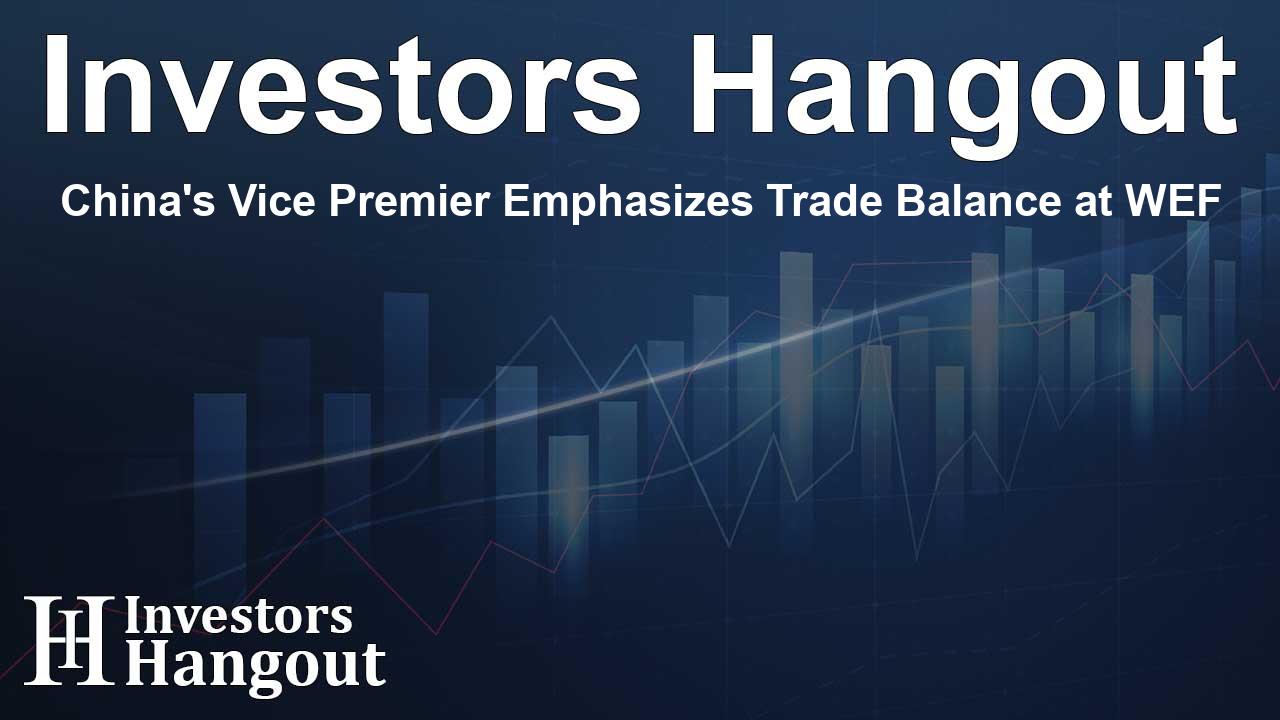China's Vice Premier Emphasizes Trade Balance at WEF

Understanding China's Approach to Trade and Economic Growth
At the recent gathering in Davos, a significant global forum, Chinese Vice Premier Ding Xuexiang presented a viewpoint that diverges from traditional notions of trade advantages. He emphasized that China is not pursuing a trade surplus but seeks to import higher-quality and more competitive products to create a balanced trade relationship.
During the 55th annual World Economic Forum (WEF), Ding articulated the idea that economic globalisation should be mutual and beneficial for all parties involved. He highlighted the need for cooperation rather than protectionism, stating, "There are no winners in a trade war," and he urged nations to choose multilateralism as a method for ensuring peace and fostering development.
China's Economic Strategies in a Global Context
Amidst concerns regarding U.S. tariffs and their potential impact on the global market, Chinese policymakers are ramping up initiatives to rejuvenate a slowing economy. The backdrop of these discussions included the recent inauguration of President Trump, who, notably, chose not to implement tariffs on China on his first day in office.
In his address, Ding welcomed foreign investment, indicating China's openness to resolving issues faced by both domestic and international businesses. His prominent role at the WEF places him among the ranks of influential global leaders, echoing the significance of international cooperation.
The Impacts of Economic Openness and Challenges Ahead
During his keynote speech, Ding referenced last year's attendance by Premier Li Qiang, who also highlighted China's readiness to engage with foreign investors. The promotion of economic openness remains a central theme for China as it navigates through a challenging period characterized by a prolonged property crisis, elevated local government debts, and tepid consumer spending.
Despite these challenges, Ding asserted that the stable growth of China's economy could serve as a vital catalyst for worldwide economic enhancement. Yet, ongoing structural issues have led to public concern regarding the quality of life in China. Analysts have noted that while China's GDP expanded by 5% recently, the benefits have not been felt evenly among its citizens.
Future Economic Expectations and Global Investor Sentiments
The government projects a GDP growth target of approximately 5% moving forward, although forecasts suggest a slowdown to about 4.5% in the coming year, and even further down to 4.2% in subsequent years. This anticipated decline has triggered anxieties among businesses and investors alike regarding the uncertainties stemming from geopolitical tensions and regulatory environments.
Foreign direct investment has witnessed a dramatic decline, plummeting over 27% from the previous year, signaling concerns that could impact China's long-term economic strategy. Ding's standing as a high-ranking official underscores the seriousness with which China is addressing these economic challenges.
Concluding Remarks on Davos Discussions and Global Relations
As discussions unfold at the WEF, stakeholders will be keenly observing any informal dialogues between Chinese officials and global business leaders. The outcomes of such meetings could play a pivotal role in shaping future economic collaborations.
Moreover, insights from WEF President and CEO Borge Brende regarding President Trump’s upcoming virtual participation have generated anticipation regarding U.S. policies that could affect global trade dynamics. The forum’s agenda addresses pressing issues including geopolitical concerns, trade relations, climate initiatives, and the potential roles of emerging technologies like artificial intelligence in improving global conditions.
Frequently Asked Questions
What did China's Vice Premier say about trade surpluses?
He stated that China is not seeking a trade surplus but aims to import competitive high-quality products to balance trade.
What is the significance of the World Economic Forum?
The WEF serves as a platform for global leaders to discuss key economic and political issues impacting the world.
How has China’s economy been performing recently?
China's GDP growth has been around 5%, but there are concerns about structural issues and slowdowns in the coming years.
What concerns do foreign investors have about China?
Investors express worries regarding geopolitical tensions and regulatory uncertainties affecting the business environment.
What is the role of multilateralism according to Ding?
Ding emphasized that multilateralism is crucial for sustaining world peace and fostering human development, especially in trade.
About Investors Hangout
Investors Hangout is a leading online stock forum for financial discussion and learning, offering a wide range of free tools and resources. It draws in traders of all levels, who exchange market knowledge, investigate trading tactics, and keep an eye on industry developments in real time. Featuring financial articles, stock message boards, quotes, charts, company profiles, and live news updates. Through cooperative learning and a wealth of informational resources, it helps users from novices creating their first portfolios to experts honing their techniques. Join Investors Hangout today: https://investorshangout.com/
Disclaimer: The content of this article is solely for general informational purposes only; it does not represent legal, financial, or investment advice. Investors Hangout does not offer financial advice; the author is not a licensed financial advisor. Consult a qualified advisor before making any financial or investment decisions based on this article. The author's interpretation of publicly available data presented here; as a result, they should not be taken as advice to purchase, sell, or hold any securities mentioned or any other investments. If any of the material offered here is inaccurate, please contact us for corrections.